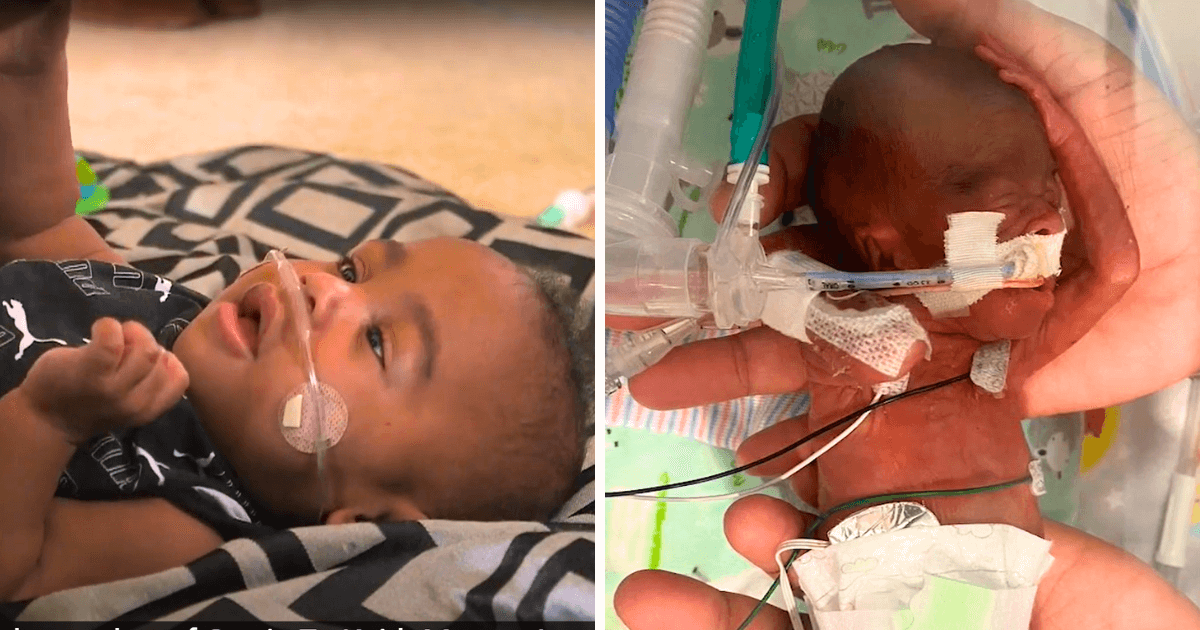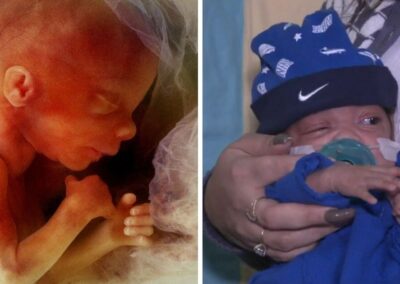The most premature surviving baby ever, born 132 days early at just 21 weeks and one day, has celebrated his fourth birthday.
Tiny baby Curtis Zy-Keith Means weighed only 14.8 oz (420g) when he was born, and doctors gave him a less than 1% chance of survival.
He was born at the University of Alabama at Birmingham Hospital in Alabama, USA, along with his twin sister C’Aysa, who sadly did not survive. After his unexpected early arrival, Curtis spent nine months in the neonatal intensive care unit at the hospital.
Curtis’s mother Michelle fought for her babies
Brian Sims, a professor of paediatrics in the neonatology division at the University of Alabama Hospital, said “His birth was a complete shock”.
“I was called by my obstetrical colleagues that Curtis’s mom was in the labour and delivery and she was precipitously about to deliver, and they wanted me to go in and talk to her about the poor prognosis of babies being born at 21 weeks and one day”.
“Mom’s question to me was “Can we give my babies a chance?”.
Professor Sims spoke about the chances of survival for babies born so prematurely: “Numbers show that babies born so young have little to no chances of survival”, Sims said. “We typically advise for compassionate care in situations of such extremely preterm births. This allows the parents to hold their babies and cherish what little time they may have together”.
Despite this, the doctor told Curtis’s mum that they would take their lead from the babies and, if they responded to treatment, they would keep going.
“It was very stressful”, Michelle said.
Whilst his little sister tragically did not make it, Curtis responded to treatment and showed signs of improvement.
Dr Colm Travers, assistant professor in the Division of Neonatology at the University of Alabama Birmingham Hospital, said “Initially Curtis was on a lot of breathing support and medications for his heart and lungs to keep him alive and then over the next several weeks we were able to decrease the amount of support and help that we were giving him”.
“Then when he was about three months old we were able to finally take him off the ventilator, and eventually when he was about nine months old we were able to send him home just on a nasal cannula oxygen and also with feeds through a gastrostomy tube”.
Dr Sims said “When Curtis was discharged, there was much excitement in the unit. Curtis was a special young man and there was something unique about him”.
“[Michelle] made the first campaign for Curtis to be alive. She was a champion for her baby, she spoke up for her baby and I’m so thankful that we listened to her”.
Record-breaking boy graduates after 275 days in the hospital
Despite the 1% chance of survival that he was given, after 275 days in hospital, Curtis graduated from the ward and was able to go home.
“Being able to finally take Curtis home and surprise my older children with their younger brother is a moment I will always remember”, Michelle said. “It was a difficult journey, but I am grateful for the UAB team and their constant support. They took the time to educate me and made sure I knew what was happening every step of the way. They truly cared about my son and me”.
Curtis is now thriving at four years old and holds the Guinness World Record for the youngest-ever premature baby to survive.
Michelle said that Curtis loves playing with his toys and watching Mickey Mouse, which is his favourite cartoon, as well as calling people up on his mother’s phone. He now weighs 33lb (15kg).
Survival rates have improved for extremely premature babies
At 21 weeks and one day, Curtis is the most premature baby ever to survive.
A 2008 study looking at survival rates for a neonatal intensive care unit in London found that neonatal survival rates at 22 and 23 weeks gestation had improved over time. In 1981-85, no babies who were born at these gestational ages survived to discharge. However, by 1986-90, 19% did and this increased to 54% in the period 1996-2000.
In the decade to 2019 alone, the survival rate for extremely premature babies born at 23 weeks doubled, prompting new guidance from the British Association of Perinatal Medicine (BAPM) that enables doctors to intervene to save premature babies from 22 weeks gestation. The previous clinical guidance, drafted in 2008, set the standard that babies who were born before 23 weeks gestation should not be resuscitated.
Spokesperson for Right To Life UK, Catherine Robinson, said “How amazing to hear that Curtis is doing so well at four years old. The fact that the world’s most premature baby was born only four years ago demonstrates how our medical technologies are improving all the time to provide these very tiny babies with the best chance of survival. What a beautiful outcome for little Curtis and his family”.












